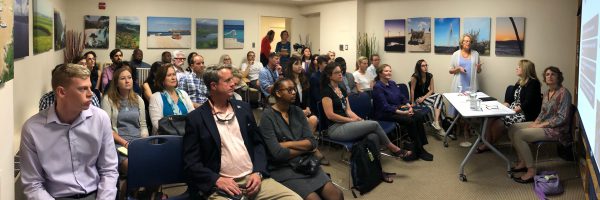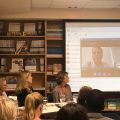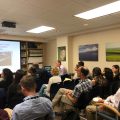
“The Lack of Sustainability is Going to Affect Us All; it’s Already Affecting Us”
June 21, 2018
GFDD hosted a discussion on “Best Practices on Sustainable and Responsible Tourism”
Global Foundation for Democracy and Development (GFDD) and its Dominican Republic Environmental Film Festival (DREFF) hosted a panel discussion at its Washington, DC office, titled “Best Practices on Sustainable and Responsible Tourism”. The conversation included international speakers such as Natasha Despotovic, GFDD/DREFF’s Executive Director and President, Villa Serena Hotel in Samaná, Dominican Republic; Jake Kheel, Vice President, Grupo Puntacana Foundation (and co-director of the documentary ‘Death by a Thousand Cuts’); Martha Honey, Co-Founder & Executive Director, Center for Responsible Travel (CREST) and Maryanne Culpepper, Executive Director, Environmental Film Festival in the Nation’s Capital (DCEFF).
Natasha Despotovic began the discussion with opening remarks about GFDD’s work in sustainable development and then presented the speakers to the audience. Each panelist had the opportunity to share their experiences working in sustainability, beginning with Jake Kheel, who talked about several initiatives that Grupo Puntacana has led in the Dominican Republic. Kheel shared how the group’s work on sustainability takes them well beyond the border of their properties. He noted that “several countries, including the Dominican Republic, have great laws but poor enforcement, and that is a problem for sustainability. Setting up co-management agreements with the local government is just one example of good things that we are doing which are being successful”.
Martha Honey then presented a case study on 50 years of the large-scale cruise industry in the Caribbean, with interesting examples and lessons from Cuba and other islands. “Cruise ships are becoming the destination itself, competing with the ports of call, which takes away potential income from the islands”, she said. Honey stressed that “we may need to go back and check what we prescribed many years ago as good practices in sustainability; they may not be sustainable anymore”.
While presenting how good storytelling is a great opportunity for sustainability practitioners, Maryanne Culpepper pointed out that the filmmaking industry worldwide has evolved in showcasing the challenges of sustainable tourism. “You want to promote tourism amongst people who will respect the destination”, she said. Culpepper also argued that the ecotourism industry should be using more Virtual Reality to enhance tourists’ experiences and increase their sales; in doing so she presented the case of “Colombia Magia Salvaje”, a film that has become a great tool for promoting pride and ownership amongst Colombians, but also for attracting tourism and creating an image of a more sustainable country.
Finally, Natasha Despotovic shared with the audience her experience of owning and managing a local boutique hotel in the Dominican Republic. She noted that “working with a sustainability perspective means educating the community” and that “sustainability must include social elements; it’s about cherishing relationships and building communities. For us it’s about promoting holistic values and healthy living.” Despotovic also said that “the lack of sustainability is going to affect us all; it’s already affecting us”.
After the presentations, the audience and speakers engaged in a lively and interesting discussion and shared even more examples and lessons learned from around the world.

-
In Collaboration with DREFF, “Alimento” Screened at Colleges and Universities Through the Faces for Hunger 2019 Festival
October 21, 2019 -
Final Countdown! Less Than a Month Until the Seventh Edition of the Dominican Republic Environmental Film Festival
October 18, 2019 -
DREFF Is Back! The Dominican Republic Is Set to Enjoy a November Full of Environmental Films and Experts—and a Lot of Surprises
August 23, 2019 -
DREFF and UNIBE close Environment Week with the documentary Revolution
June 12, 2019 -
At the International Book Fair, ReCrearte workshop participants discover the potential of creative recycling
May 7, 2019 -
Dominican Documentary “Cacú: un cambio por la vida” Screened in Packed Funglode Auditorium
March 29, 2019





















